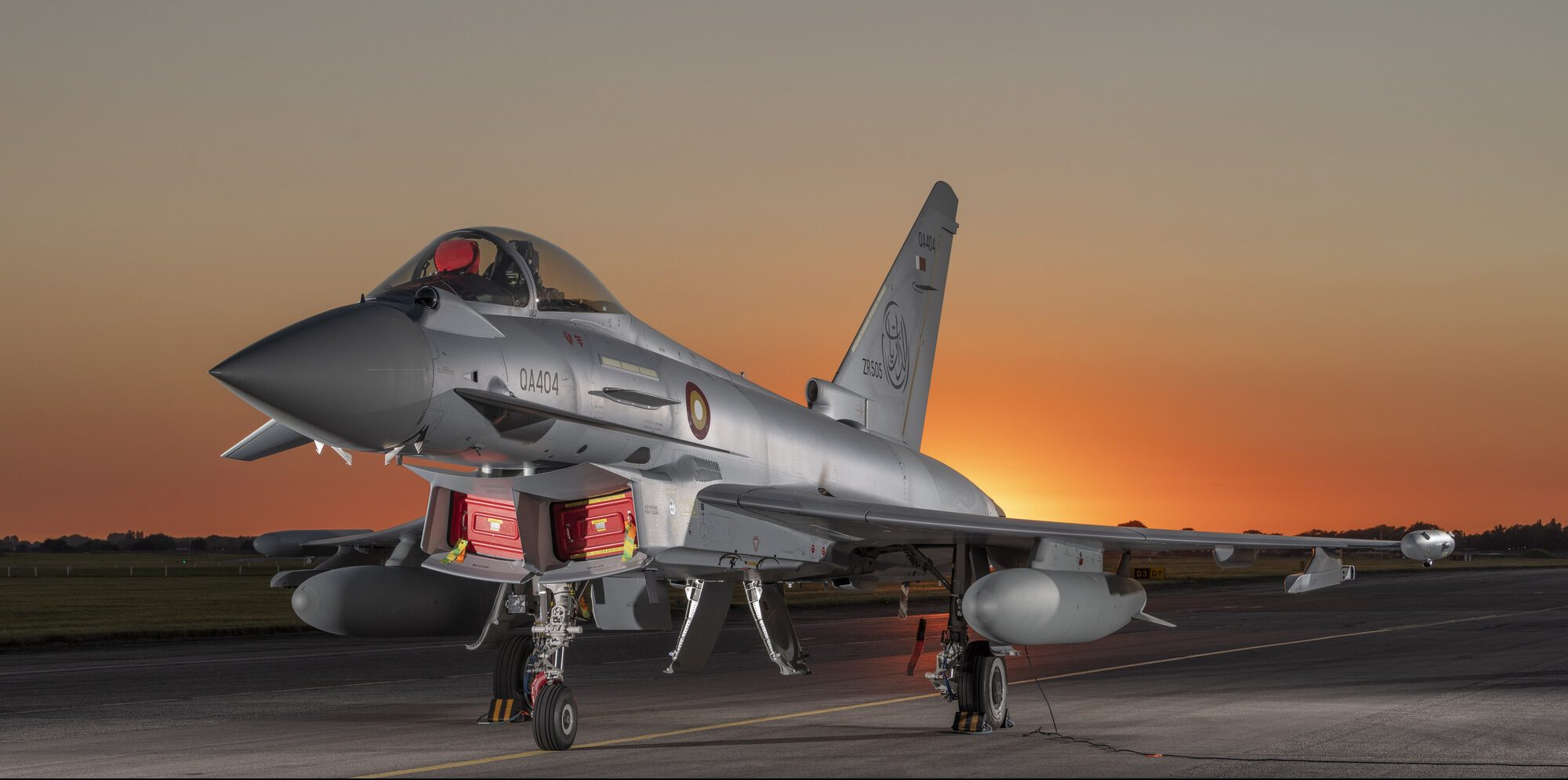The Gulf state is one of the UK’s most important defence customers.
Qatar is set to receive its first Typhoon aircraft from the UK this month as part of wider efforts to secure the upcoming 2022 FIFA World Cup, Doha’s state news agency (QNA) reported on Monday.
The report came during the inauguration of the Qatari Typhoon aircraft at Warton airbase in the UK, in a ceremony attended by defence ministers of both states along with various other officials.
“Today’s Typhoon delivery is another exciting milestone for our joint UK-Qatar collaboration, which will see the sharing of training and expertise between our respective air forces and will ensure both our nations stay at the forefront of defence capability,” said UK Defence Secretary Ben Wallace.
According to British aerospace company BAE Systems, the inaugurated fighter jet is the first out of 24 ordered by the Gulf state to join the Amiri Air Force, as part of a 2017 contract.
“We are working in partnership with the QEAF to ensure we transfer the skills and knowledge required to support, maintain and upgrade both their Typhoon and Hawk aircraft,” said Tony Gilchrist, Director Business Development, BAE Systems Air Sector.
Qatar-UK defence
Qatar is one of the UK’s most important defence customers.
With the 2022 World Cup around the corner, Doha and London have announced major cooperation to ensure the Gulf state hosts a safe sporting event.
Last year, Qatar and UK defence officials discussed joint security for the World Cup, with the allies taking part in the ‘Watan’ exercise to test the preparation for the tournament.
Bilateral defence ties were further discussed in May during the visit of Qatar’s Amir Sheikh Tamim bin Hamad Al Thani to the UK.
Soon after, London announced it would be providing air policing during the much-anticipated World Cup in Qatar – marking the first such time that Britain provides this level of security to a World Cup held outside the UK.
The Joint Typhoon Squadron, also known as 12 Squadron, is the UK’s first joint squadron since World War II and will be in charge of counter-terrorism operations.
The UK-based Typhoon squadron is headquartered at the Royal Air Force Coningsby in Lincolnshire, and has regularly trained in Qatar since its creation as a combined squadron in July 2018.
World Cup security
Beyond the UK, Qatar has partnered with other countries in an effort to secure the sporting event.
Earlier this month, Jordanian media reported that authorities in Amman are offering security jobs at the Qatar World Cup to retired soldiers. Jordan’s Security Directorate’s announced posts to previously serving personnel under the age of 45.
Meanwhile, Turkey announced in July plans of sending chemical, biological, radiological and nuclear defence (CBRN) personnel during the event. The Turkish Armed Forces have been carrying out CBRN duties since 1930.
The announcement was the latest of other Turkish efforts to secure the World Cup in Qatar.
In December last year, Turkey announced plans to send some 3,000 members of its riot police units to Qatar for the World Cup.
Turkish Interior Minister Suleyman Soylu told the press that the number of officers may be increased, with a general coordinator from Turkish law enforcement, more than 40 security advisers, and search dogs to be dispatched to Qatar.
Also in July, South Korean reports stated the Asian nation’s army will dispatch five police officers specialising in counter-terrorism to Qatar to exchange security expertise.
This is also set to be the first time South Korea’s military police dispatches its personnel abroad.
In Europe, France agreed in December last year to send personnel and material to the Gulf state, including a BASSALT anti-drone system that detects and identifies incoming drones.
France also said it will be sending one of its Air Force’s four E-3F Airborne Warning and Control System (AWACS), which can track hundreds of targets.
In the US, members of Qatar’s police forces met with the New York Police Department’s (NYPD) Transit Bureau team in January to exchange expertise over safety and security best practices during major events.
More recently, the US Department of Homeland Security (DHS) signed agreements with Qatar over World Cup security.
The DHS would help “identify air passengers linked to terrorism, trafficking, detecting watchlisted travelers, and monitoring potential security risks at Hamad International Airport,” as it explained in a joint statatement.
Both parties also agreed on further commitment to collaborate on countering threats from unmanned aircraft systems (C-UAS), and “DHS is committed to sharing lessons learned and best practices on C-UAS to help secure World Cup Qatar 2022.”
Closer to the Gulf state, Morocco said it deployed “thousands” of police officers to Qatar in June to aid the gulf nation in bolstering security for the upcoming event. Morocco had also agreed to deploy a team of cybersecurity experts to Qatar.
Meanwhile, NATO announced that it will help Qatar with security measures during the event as part of the alliance’s tight collaboration with Doha.
“The support will include training against threats posed by Chemical, Biological, Radiological and Nuclear (CBRN) materials, which will be delivered by Slovakia and NATO’s Joint CBRN Defence Centre of Excellence in the Czech Republic,” the North Atlantic alliance explained in a statement.







